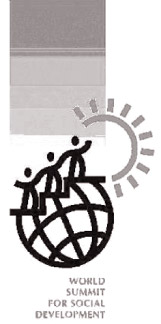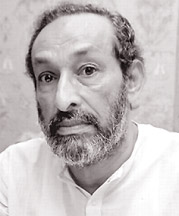Opening doors, hearts and minds with social inclusion
Lionel WIJESIRI
The World Summit for Social Development in Copenhagen in 1995 defined
an inclusive society as ď'a society for allí, in which every individual,
each with rights and responsibilities, has an active role to playĒ.

 |
|
Minister
Vasudeva Nanayakkara |
An inclusive society is equipped with mechanisms which accommodate
diversity, and facilitate and enable peopleís active participation in
their political, economic and social lives. It over-rides differences of
race, gender, class, generation, geography and ensures equal
opportunities for all to achieve full potential in life, regardless of
origin. Such a society fosters, at the same time, emanates from
well-being of each individual, mutual trust, sense of belonging and
inter-connectedness. When confronted with new challenges, such as
external economic shocks, unexpected changes, national disaster or
crisis, an inclusive society is one that shows more resilience than
others.
It is in this context that we should view the draft National Policy
Framework for Social Integration prepared by the Ministry of National
Languages and Social Integration. At a recent interview, Minister
Vasudeva Nanayakkara said the aim of the proposed policy is to promote
social inclusion and facilitate upward mobility for all. It seeks to
create a new social-consciousness and to foster a strong sense of
belonging to the nation.
The ministry should be congratulated for taking this timely step.
This brief article contains few thoughts which crossed the mind of the
writer after going through the ministerís interview. It studies the
challenges faced for the creation of social inclusiveness in Sri Lanka.
Approach
The first question any sensible person would ask is how we should
make the concept of social inclusion operational, even in the face of
resistance to change. We have seen in the past that there were many
instances where social exclusion was wilfully pursued as it serves
vested interests. The challenge for our policy makers is, therefore, to
find ways of redefining social inclusiveness as a practical tool used to
promote an inspirational yet realistic set of policy measures geared
towards a 'society for all.'
This requires a paradigm shift so as to recognize the dignity, value
and importance of each person, not only as an ethical norm and
imperative, but also as a legal principle, a societal goal, and
ultimately, practice. To this end, social inclusion, as an overarching
goal as well as a multi-dimensional process can play a critical role in
promoting sustainable human development.
Requirements
The writer believes that there are few elementary requirements to
create an inclusive society.
1. Respect for the rule of law. This is the most fundamental
requirement. Every member of society, no matter what his or her
ethnicity, political status, or social standing, must be treated equally
under the law. Violators should be brought to justice expediently and
justice meted. The judiciary must be impartial, accountable and
inclusive to giving weight to the opinions of those who defend the
inclusiveness of the society.
2. Ensure full participation in public policies through programme
design and implementation measures, targeted to those often overlooked.
The design and implementation of public policies should be tailored
rather than one-size-fits all in order to meet the wealth creation needs
of all people, paying special attention to those still affected by past
exclusion such as rural and estate sector. The policies must also
include intentional inclusion of all our diverse ethnic populations.
3. Recognize that a comprehensive human capital agenda is necessary
for an economically inclusive society. The disadvantaged sectors need
equal access to the educational, health, civic, and economic
opportunities that are necessary to reach the economic mainstream and
maximize contributions to society. These opportunities are interlocking.
When people have access to quality preventive health services, they are
in the best condition to learn. When they live in prosperous
neighbourhoods, they have access to quality education. With education,
they can better become inventors and entrepreneurs. When they are
empowered and engaged in the civic arena, they can attract public
resources that support economically sustainable communities. They are
then positioned to add value to the national economy.
4. Craft public policies to support wealth creation and asset
building that provide opportunities to move up the economic ladder for
all those stuck on the lower rungs. While income is vital for working
families, income alone is not enough to provide economic security over a
lifetime. Promoting asset accumulation and development - whether through
tax incentives, supporting savings, or encouraging entrepreneurship
through small business programmes or other means - are ways that public
policies can give all Sri Lankans a pathway to prosperity.
5. Draw upon the perspectives of and resources created by
disadvantaged groups to develop public policy. Too often, 'experts' who
have very little real-world experience in or with communities of the
disadvantaged groups have the most influence in shaping policies
intended to address issues facing these communities. The result is often
a failure to achieve the desired outcome. Researchers, community
practitioners, policy experts, and advocates from communities of the
disadvantaged have a first-hand understanding of the affected
communities. Their experience, coupled with the insights provided by
them, could be utilized to design effective policy solutions that will
have a successful and lasting impact.
6. Equity in the distribution of wealth and resources is another
critical element of inclusive societies. How the resources are allocated
and utilized will significantly affect the orientation of society,
either towards a more integrated, inclusive society, or an exclusive and
disintegrated one. Therefore, socio-economic policies should be geared
towards managing equitable distribution and equal opportunities.
7. Cultural diversity. By celebrating diversity, there is a
recognition and affirmation of the differences between and among members
of society, which enables societies to move away from labelling,
categorizing, and classifying people, towards more inclusive policies.
Also, enabling a diversity of opinions provides the checks and balances
crucial for the development of society, while allowing for the greatest
amount of diverse opinions to enter every discourse.
Tri-lingual Si Lanka
The 30-year long conflict has had long lasting effects to our country
in many different ways. Immediately after the peace was restored in
North and East, the government took long-term measures to fortify unity
among Sri Lankaís ethnic groups. The measures taken include the
visionary move for a Trilingual Sri Lanka; through the focus on making
the public of this country knowledgeable in Sinhala, Tamil and English,
what is being aimed at is the bridging of all language barriers which
have been keeping our communities in separate language cocoons and
preventing them from communicating meaningfully with each other.
The opportunity to achieve economic advancement and security has been
an abiding ideal underlying Sri Lankan progress. Given our nationís need
to ensure our economic and political stature in a changing global
economy, it should be our collective interest that every one of us
achieve financial security, have opportunities for upward mobility, and
participate in securing our nationís economic future.
However, a wide wealth gap among urban sector, rural sector and
estate sector which prevents us, as a country, from reaching our
economic potential. As a result, many of us cannot fully participate in
our economic system or provide financial security for our families. This
gap must be minimised in order to remain economically competitive in an
increasingly demanding global environment and live up to our democratic
ideals. The structural nature of the wealth gap can be traced to public
policies and practices that undermine equal opportunity. These policies
- both historic and contemporary - have intentionally or inadvertently
suppressed asset accumulation and wealth creation in communities of
rural sector.
It goes without saying that expanding economic opportunities for
people of rural and estate areas is an essential strategy for a
prosperous Sri Lanka. We need all of our available resources to remain
competitive in the expanding global economy. Members of historically
marginalized groups are a key untapped or underutilized resource;
aggressive steps to ensure that all members of these groups fully
participate in and benefit from the economic mainstream will benefit all
of us. Our diversity is our strength, and gives us a unique competitive
advantage in an interconnected global economy.
A society with no vision for the future indicates a society in
decline. Societies that maintain a unity of purpose, or a shared vision
embraced by the community, and encourage broad-based stakeholder
participation in the formulation of that goal, will be more inclusive as
every member will be working synergistically towards a unified
objective.
|



